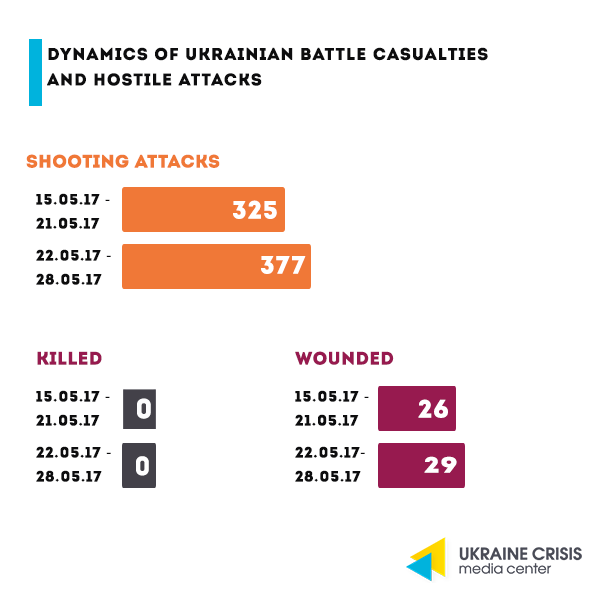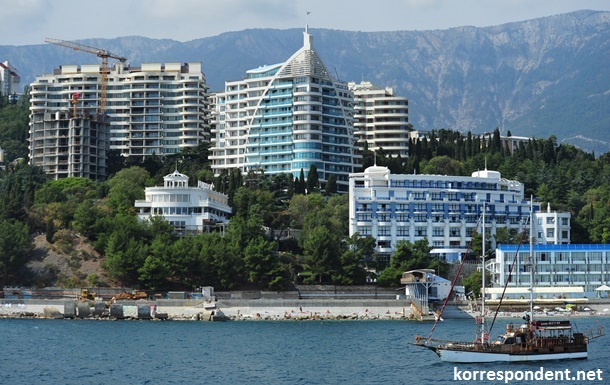Situation in the combat zone


The situation in the combat zone remains extremely tense.
Attacks upon the residential blocks of peaceful towns. On May 28 militants were shelling government-controlled Krasnohorivka with Grad, tanks and mortars for three hours. According to the Head of the Police Office in Donetsk region Vyacheslav Abroskin, four civilians were wounded. Hospital was damaged as a result of the attacks, personnel and patients were evacuated. School and 29 more buildings were also damaged. Militants fired from the outskirts of Donetsk. On May 25 the central hospital in the nearby Maryinka was severely damaged, when the attack took place people were inside the hospital.
Increase in civilian casualties. The first five incomplete months of 2017 saw the increase of civilian casualties in Donbas by 110 per cent in comparison to the similar period last year. As of May 24, OSCE has confirmed 225 civilian casualties since the beginning of the year, 44 persons were killed and 181 were wounded. According to the OSCE’s data covering the same period last year there were 107 civilian casualties, 84 persons were wounded and 23 killed. The data was reported by Alexander Hug, Principal Deputy Chief Monitor of the OSCE Special Monitoring Mission to Ukraine.
Life in “LPR” / “DPR”
World’s most expensive vehicle. Car magazine “TopGir” published a photo of the luxury SUV Bentley Bentayga with a car plate of the “DPR” organization recognized illegal in Ukraine. Media put forward a hypothesis that the same Bentley Bentayga had been spotted in Donetsk back in autumn 2016. However, that vehicle had a German car plate. Bentley Bentayga is considered to be the most expensive and fastest serial SUV in the world. The car’s basic version costs $300-350 thousand.
Ukraine’s visa free regime, internally displaced persons and “D/LPR”. This summer the decision on the visa free regime with the EU will come in force in Ukraine. Head of the State Migration Service Maksym Sokolyuk noted that no boom is being observed in Donbas as to the applications to get a biometric passport. Over 3,5 million Ukraine citizens have already received biometric passports. All Ukraine citizens in possession of the ID (domestic passport) are entitled to receiving a biometric passport to travel without visas to the EU member states.
Fight for the anticorruption auditor
Ukrainian chosen instead of international experts. The government has chosen their representative to the post of the National Anticorruption Bureau (NABU) auditor. Mykhailo Buromenskyi, PhD in Law, president of the Institute of Applied Humanitarian Research, won the competition. Other 11 contestants included Giovanni Kessler, Carlos Castresana and Martha Boersch. Buromenskyi was recommended for the post by the Ukrainian Helsinki Human Rights Union, OSCE in Ukraine and GRECO. Professor Buromenskyi is head of the international law department at the Yaroslav Mudryi National Law University. He is also member of the Constitutional Commission under the President of Ukraine and of the working group on decentralization. The newly appointed auditor served as an ad hoc judge of the European Court of Human Rights between 2009 and 2012, in May 2012 he became a member of Ukraine’s Constitutional Assembly.
Civil society is disappointed with the fact that the government has chosen a Ukraine national, as it creates a possibility to exercise pressure upon the auditor. Civic actors also note the lack of work experience by Buromenskyi in law enforcement agencies abroad – that was actually one of the requirements for the future auditor that the International Monetary Fund (IMF) put forward (the IMF memorandum in English). Daria Kaleniuk, Head of the Anticorruption Action Center, is of the opinion that the move puts an end to the independent nature of the NABU.
According to the Law on the National Anticorruption Bureau, the Parliament (Verkhovna Rada) and the President are yet to appoint their auditors.
Prosecutor General’s one year in office
Yuriy Lutsenko reported to the Parliament (Verkhovna Rada) on his year in office as the Prosecutor General of Ukraine. He named the court proceeding over Ukraine’s former president Viktor Yanukovych his main achievement. Lutsenko also provided updates on how investigation into the crimes against the Maidan is advancing as well as on the amount of money that the Office of the Prosecutor General had returned to the state this year (UAH 52 billion, an equivalent to approx. EUR 1,8 billion). He also noted that 200 hectares of land are being returned back into public possession daily. Lutsenko reported that the number of personnel had been reduced by one quarter and that the new staff members were selected through an open competition, while the majority of them have never been part of the agency. Sixteen persons of Yanukovych’s inner circle have been convicted, court proceeding is on against other 32 ones. In the Maidan-related cases 228 persons have been charged and 42 convicted.
In their turn, journalists and experts noted that the Office of the Prosecutor General had not dismissed the key staff members seen involved in the corrupt schemes and had not advanced in investigating into the case of the murder of journalist Pavlo Sheremet. Moreover, no drastic reforms had been held. A week before the Prosecutor General presented his report, MP Yegor Sobolev said he started collecting signatures in support of Lutsenko’s resignation. In his opinion the key investigations of the agency have failed while those that have been completed are an imitation.
G7 meeting summed up, Ukraine in focus
In Taormina, Sicily, G7 leaders signed the declaration against terrorism, discussed foreign trade and climate change as well as further extension of sanctions against Russia resulting from its military aggression in Ukraine. G7 leaders claimed ready to reinforce the sanctions against Russia imposed after the annexation of Crimea.
On May 27 political leaders of the UK, Germany, Italy, Canada, the US, France and Japan with participation of the President of the European Council Donald Tusk and the President of the European Commission Jean-Claude Junker adopted the final declaration that also envisaged their joint position on Russia’s actions.
Crimea: self-proclaimed authorities hold an auction of “nationalized” real estate
Crimean de-facto officials keep putting on sale “nationalized” property. They are in try to cover the gaps in local budget with the real estate seized from former owners. On May 24, the Russia-controlled Crimean parliament approved another list of objects to be privatized. They are about two dozens of sites located in the near-sea areas.
Two resort facilities – “Gorska” (on the western coast) and “Morsky Bereh” (“sea coast”, on the eastern coast) as well as the rehabilitation center “Nadiya” (hope) near Feodosia are planned to be put on auction. Cost estimate of the objects to be privatized is 236 million rubles (approx. EUR 3,74 million). “It is planned to direct 200 million rubles for reimbursement payments, while 36 million rubles – to the state budget,” reads the statement of the Russia-controlled Crimea government. Two years ago, Sergey Aksyonov, self-proclaimed prime minister of Crimea was offering the investors to lease the abovementioned objects for 1 ruble.
Ukrainian language quota on television
On May 23, the Ukrainian Parliament (Verkhovna Rada) passed the law that sets the mandatory 75 per cent quota of Ukrainian-language content on nationwide TV channels. According to the law the shows, films and news programs in Ukrainian need to make up for at least 75 per cent of the overall broadcasting length of the programs and films between 7 a.m. and 10 p.m.. Local television channels need to maintain their Ukrainian-language broadcasting at least up to 60 per cent.
According to the monitoring made by the national regulator some nationwide TV channels (Inter, Ukraina) broadcast in Ukrainian only one fourth of their content. Approval of the law became the next step in implementation of the state policy set to reinforce the position of and to legally protect the state language in the media. Earlier, in November 2016, the law introducing quotas on the radio for songs and programs in Ukrainian came into force.
Sports: Ukrainians paddle in the Hungarian waters
The ICF Canoe Sprint World Cup ended on May 28 in Szeged, Hungary. Ukrainian athletes won six medals over the three competitive days. Maria Kichasova and Anastasia Horlova won gold in the women’s 200m kayak sprint double. Dmytro Yanchuk and Taras Mishchuk won silver in the men’s 500m canoe sprint double; Vitalii Tsurkan and Oleh Kukharyk won silver in the men’s 1000m kayak sprint double. Liudmyla Luzan (500m canoe sprint), Ihor Trunov and Ivan Semykin (500m kayak sprint double) and Oleh Kukharyk (500m kayak sprint) brought Ukraine three bronze medals.
Culture: spaces of the industrial city become locations of the media art festival
On June 3-11 the city of Dnipro will host for the fourth time the festival of new media and audiovisual art in urban space “Construction Festival”. The organizers – local NGO Kultura Medialna, will present visual and media art, music, urbanism projects etc. in the city’s non-specialized public spaces and buildings, thus granting them a new meaning and role. Over the past three editions over 30 locations were engaged and rediscovered including the railway station Pivdenny (southern), planetarium, aquarium, botanical gardens, the hall of organ and chamber music, former Illicha house of culture, Volodarsky factory etc.
This year one of the eight locations of the festival – “Stsena” (stage) at the Shevchenko park, is being constructed jointly by the “Construction Festival” team and a group of Polish, Danish, Swedish and British architects and urbanists. The musical program will include experimental concerts and a boat party featuring musicians from the Czech Republic, Poland, Germany, Sweden, Lithuania and Ukraine. Students’ Palace, Museum of Arts and Artsvit gallery will become platforms to showcase Israeli, Swedish and British video art. Artistic residence Civic Media Lab is to unite media artists from Eastern Partnership countries and from Germany.
English-language materials by Ukrainian media
Reportage
”Ukraine appoints auditor for the Anti-Corruption Bureau” – Hromadske International
“Meet the orphans of the war in eastern Ukraine” – Hromadske International
“Kyiv: Jewish band plays a solidarity gig for a Kyiv-based Lebanese cafe attacked by far-rights” – Hromadske International
Opinion
”Language quotas in Ukraine : Are the print media next in line?” – the column of Taras Petriv for UNIAN
Analytical materials
“Production decline, IMF advice and Agriculture Minister’s farewell” – UNIAN’s week’s balance
”Ukraine and NATO: 20 years nearby. But not together” – The Day
“Auditoor of the National Anticorruption Bureau, one year in office of the Prosecutor General, arrests in Moldova” – the Sunday Show by Hromadske International
”Six need-to-know things about Ukraine’s controversial Prosecutor General” – Hromadske International

